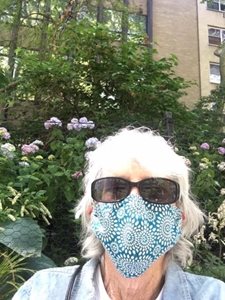Isolation During COVID-19: A Different Perspective
My isolation started before COVID-19, and I don’t think I understood how isolated I had become until the pandemic, when I have oddly felt more at ease.
You see, I have primary progressive multiple sclerosis and, as of last summer, after major emergency surgery, the added limitation of an unexpected ostomy bag. A double whammy. And I am over 65. Even without COVID-19, my life had slowly become smaller and smaller, and it got harder and harder for me to do the things that I love and that define me.
My isolation does not hold a candle to how others are suffering under coronavirus, with high stress, illness, death and loss of income. Still like everyone, I have been scared and sad — especially since my husband and I find ourselves unintentionally separated for months over 2,000 miles. I long to hold him and be held. I long for hugs and laughter with friends and family over a meal. I struggle without the help of caretakers. I want to stop walking on eggshells, stop wearing gloves and masks. I want the world to heal.
But oddly, unlike others, I have felt less alone during this quarantine and more accepting of being alone. I don’t feel the pressure of keeping up with everyone. I almost feel relieved because the world is in isolation with me and it is making more of an effort to reach out to all of us at home.

What has made it easier for me in quarantine is that my friends and family now have more time to talk and to ask more often how I am. I connect more easily with others through new virtual tools that bring us closer and face-to-face like Zoom, FaceTime and GoToMeeting. Before the quarantine, everyone was so busy that we had to make a date to see each other sometimes weeks ahead and then (especially challenging if I had to go alone), I had to plan and strategize how I would get there, then how to navigate stairs and traffic, open doors, find a bathroom-especially a bathroom with a high enough toilet with grab bars. And if eating, I had to take extra steps to make sure there would be something I could eat on my more restricted diet. Now, everyone’s schedule is freer. I am always in an accessible space. I only cook and plan meals that fit my restricted diet. Because of the growth of streaming, online services, I now have greater and easier access to doctors, cultural events, meetings, lectures and museums.
As the world opens up and life is getting better and easier for others, will it again be harder for me? Will I feel more isolated again, more aware of my physical limitations and marginalized as a senior? Will we who are older and more vulnerable be left behind as we ontinue to pull back cautiously, avoiding large gatherings with gloves and masks?
There is a growing resentment of COVID-19 restrictions; will this anger and frustration be directed at me and others like me? How will I change after this experience? When this pandemic is past us, how much will the world continue to reach out and accommodate those of us who don’t have a choice but to stay at home?
Editor’s Note: The Society continues to be there for people affected by MS. For the latest information and resources related to COVID-19, please visit the Society’s Coronavirus Resources Page. Find additional resources through our Ask an MS Expert webinar series.
Topic MS Experience
Tags COVID-19, Community, I have MS, MS Awareness
Related Posts
What You Need to Know About Fall Vaccines: Flu, COVID-19 and RSV
Dr. Lisa Doggett explains why people living with MS should plan to get vaccinated this… Read More
I get knocked down, but I’ll get up again
Recovering from a fall can be challenging. Read how one person gets up.
Staying above water with MS
One blogger describes finding support and learning to love life again after his MS diagnosis.





